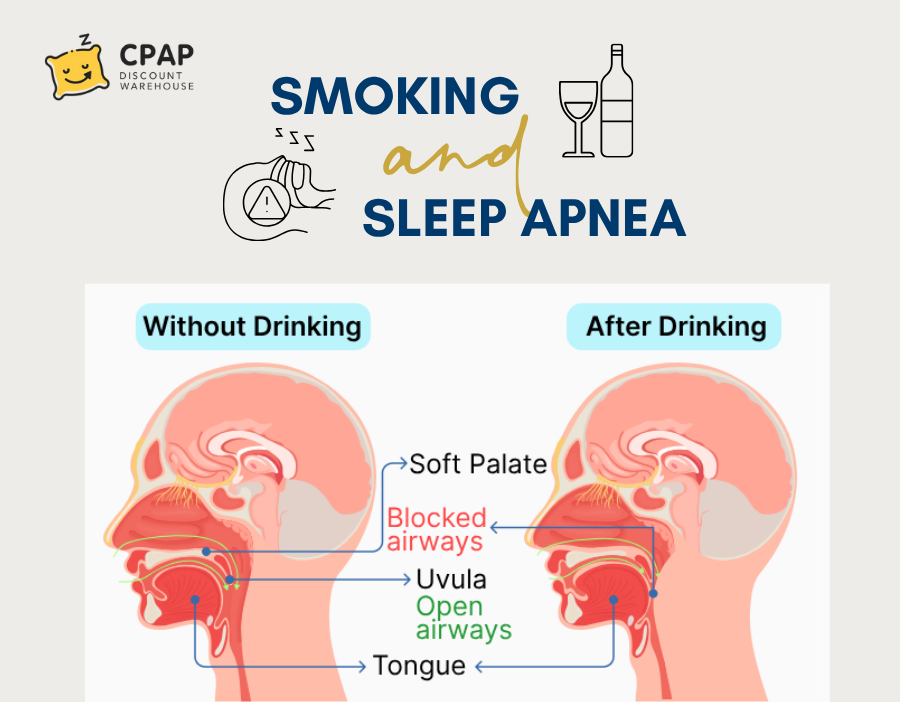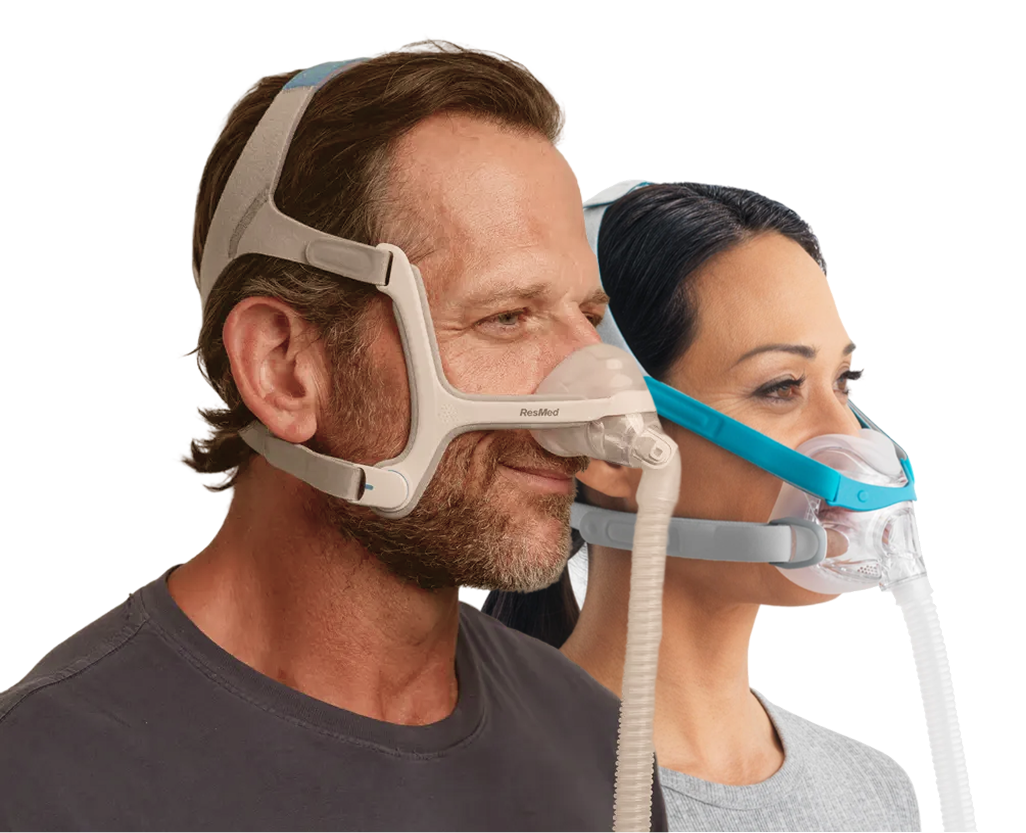Alcohol may help you fall asleep quickly, but it significantly lowers sleep quality, especially in people with sleep apnea. It reduces REM sleep, relaxes airway muscles, and leads to more frequent snoring and apnea events. This combination makes alcohol a major disruptor of CPAP therapy by worsening airway obstruction. For anyone managing alcohol and sleep apnea, cutting back on drinking can improve sleep and therapy results. To ensure consistent treatment, CPAP Discount Warehouse offers affordable, high-quality equipment designed to support uninterrupted sleep and long-term health.
Understanding the Connection Between Alcohol and Sleep Apnea
Sleep apnea is a serious and chronic sleep disorder where breathing repeatedly stops and starts during sleep. These breathing disruptions lower oxygen levels in the blood and interfere with deep, restorative rest. There are two main types of sleep apnea: Obstructive Sleep Apnea (OSA) and Central Sleep Apnea (CSA).
Obstructive Sleep Apnea occurs when the airway becomes physically blocked, usually due to relaxed throat muscles. Central Sleep Apnea, on the other hand, happens when the brain fails to signal the respiratory muscles to breathe. Both forms can be worsened by alcohol consumption, though the mechanisms differ.
Alcohol and Central Sleep Apnea
Central Sleep Apnea is often linked to underlying health conditions such as heart failure, neurological disease, or chronic opioid use. Alcohol can significantly interfere with the brain’s ability to regulate breathing patterns during sleep.
Alcohol suppresses the central nervous system, including the respiratory centers in the brainstem. This suppression decreases the body’s natural drive to breathe by dulling the response to rising carbon dioxide levels. As a result, breathing pauses become longer and more frequent.
In people with existing medical conditions like congestive heart failure or stroke, this effect becomes more pronounced. Alcohol amplifies the risk of unstable breathing during sleep and may lead to dangerous levels of oxygen desaturation. This interaction between alcohol and central sleep apnea is particularly important to recognize in medically vulnerable populations.
The Link Between Alcohol and Obstructive Sleep Apnea
Obstructive Sleep Apnea is the more common form and is strongly influenced by muscle tone in the upper airway. Alcohol causes these muscles to relax more than usual, especially in the soft palate and tongue area.
This relaxation narrows the airway and increases resistance to airflow. The result is louder and more frequent snoring, a hallmark symptom of sleep-disordered breathing. For many individuals, this leads to a noticeable pattern: sleep apnea only when drinking alcohol, especially in the hours before bedtime.
The relationship between alcohol snoring and sleep apnea is well documented. Snoring that worsens after alcohol consumption is more than a nuisance. It often signals increased vulnerability to airway collapse. In fact, many people report alcohol and snoring sleep apnea episodes that are absent when they avoid drinking.
If snoring is accompanied by daytime fatigue, gasping during sleep, or frequent awakenings, it may point to undiagnosed OSA. In such cases, alcohol acts as a significant contributing factor and may reduce the effectiveness of treatment options like CPAP therapy.

Does Alcohol Make Sleep Apnea Worse?
Alcohol has a direct impact on sleep apnea by increasing the likelihood and severity of breathing disruptions during sleep. One of the main reasons is its effect on upper airway muscle tone. When a person drinks alcohol, especially close to bedtime, the muscles in the throat and soft palate become more relaxed than usual. This makes the airway narrower and more prone to collapse, which can trigger or worsen obstructive sleep apnea. Even individuals who do not regularly experience apnea may develop symptoms after drinking.
Beyond muscle relaxation, alcohol also interferes with sleep architecture, particularly by suppressing REM sleep. REM is the most restorative stage of sleep, but it is also the phase where breathing is naturally more irregular. Alcohol reduces the total time spent in REM and delays its onset, which disrupts sleep quality. More importantly, it weakens the brain’s ability to respond quickly to oxygen drops, resulting in longer apneas and deeper oxygen desaturations.
Evidence from clinical sleep studies reinforces this connection. Research consistently shows that alcohol consumption before bedtime increases the Apnea-Hypopnea Index, a key measure of sleep apnea severity. These effects are especially noticeable in moderate to heavy drinkers, but even light alcohol use has been linked to increased snoring, fragmented sleep, and more frequent breathing disturbances. For individuals with sleep apnea, limiting alcohol intake is a critical step toward better nightly breathing and more effective treatment outcomes.

Sleep Apnea and Alcohol Withdrawal
Quitting alcohol can bring temporary but significant changes to sleep, especially for individuals with sleep apnea. Without the sedative effects of alcohol, many people experience a noticeable decline in sleep quality during the first few days or weeks. Some may even feel their sleep apnea symptoms worsen during this time, but this is usually part of the body's adjustment process.
Alcohol withdrawal often leads to insomnia and vivid dreams, causing frequent nighttime awakenings. This sleep disruption can make sleep apnea feel more pronounced. However, it is important to recognize that these effects are typically short-lived and tend to improve as the body stabilizes without alcohol.
To manage this phase effectively, it helps to follow a sleep-focused plan. Establishing a consistent bedtime, limiting screen use before sleep, and creating a calm sleep environment can reduce withdrawal-related insomnia. In some cases, working with a sleep specialist can support long-term recovery while managing sleep apnea symptoms more effectively.
Living With Sleep Apnea
Living with sleep apnea requires more than just treatment devices. Making consistent lifestyle changes can significantly improve sleep quality. Eating meals earlier in the evening, maintaining good hydration throughout the day, and sleeping in a side position or with your upper body slightly elevated can help minimize nighttime breathing disruptions.
Certain natural methods also show promise in easing symptoms. Techniques like yoga breathing, gentle weight reduction, and nasal rinsing have supportive evidence from clinical studies. Herbal options such as chamomile or valerian may provide added relaxation, though they should only be used with guidance from a healthcare provider.
If these steps do not provide relief, or if symptoms worsen, it is important to seek professional help. Early medical intervention can prevent complications and lead to better long-term outcomes.
FAQs
If I Stop Drinking Alcohol, Will My Sleep Apnea Go Away?
Quitting alcohol can significantly improve your sleep apnea symptoms, but it may not completely eliminate the condition. Alcohol and sleep apnea are closely linked, as alcohol relaxes the muscles in the airway and increases the likelihood of obstruction. Reducing or eliminating alcohol can make treatments like CPAP more effective and reduce apnea episodes.
Does Sleep Apnea Go Away?
Sleep apnea typically does not go away on its own, especially OSA. However, symptoms can be managed or improved through weight loss, lifestyle changes, and consistent use of CPAP therapy. Addressing alcohol consumption is a key step, as alcohol and sleep apnea together often worsen breathing disruptions during sleep.
What Is the Best Sleep Position for Sleep Apnea?
Sleeping on your side is generally considered the best position for people with sleep apnea. It helps keep the airway open and reduces the likelihood of apnea episodes. Avoiding back sleeping, especially after consuming alcohol, is crucial, as alcohol and sleep apnea combined can make airway collapse more frequent in that position.
Can I Use CPAP After Drinking Alcohol?
Yes, you can use a CPAP machine after drinking alcohol, and in fact, it’s even more important to do so. Alcohol can deepen sleep and increase the risk of airway collapse, making CPAP therapy essential for maintaining breathing throughout the night. However, limiting alcohol intake is strongly advised to improve the overall effectiveness of CPAP treatment and reduce risk.
Conclusion
Alcohol can worsen sleep apnea by relaxing upper airway muscles, reducing respiratory drive, and disrupting natural sleep patterns, particularly REM sleep. These changes often lead to more frequent breathing pauses and fragmented rest. Although giving up alcohol may not completely eliminate sleep apnea, it can significantly ease symptoms. Managing the condition effectively requires a combination of healthy lifestyle choices and proper treatment. For reliable therapy solutions and support, consider exploring CPAP Discount Warehouse.






